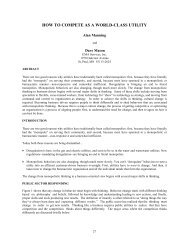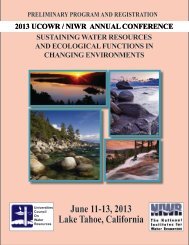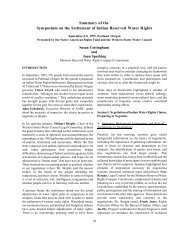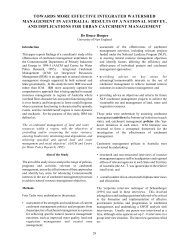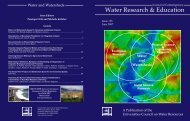106Lamoree <strong>and</strong> van Steenbergeninterests, rather than only those values pertinentto the sector <strong>of</strong> society or government that theyrepresent.Author Bios <strong>and</strong> Contact InformationBEN LAMOREE is a water resources management specialistwith experience in river basin management, inparticular the institutional arrangements in which riverbasin management can be made to deliver integratedwater resources management services to society. Hehas published various papers on the institutional setup<strong>of</strong> river basin management, also in a transboundarycontext. He has worked extensively in Africa, <strong>and</strong> inselected countries in Latin America, the MiddleEast <strong>and</strong> Asia. Mr. Lamoree holds an M.Sc in CivilEngineering <strong>and</strong> is a senior staff member <strong>of</strong> ARCADISEuroconsult in the Netherl<strong>and</strong>s. Contact information:Arcadis Euroconsult, PO Box 441, 6800 AK Arnhem,the Netherl<strong>and</strong>s; G.Lamoree@ arcadis.nl.FRANK VAN STEENBERGEN is a water resourcesmanagement specialist with experience in integratedwater resources management, in particular from theirrigation <strong>and</strong> drainage sectors. He has published widelyon issues such as transboundary river basin management,(spate) irrigation <strong>and</strong> the financing <strong>of</strong> irrigation services.He has worked extensively in Asia, the Middle East <strong>and</strong>Africa. Mr. Van Steenbergen holds a Ph.D in Geography<strong>and</strong> is a senior staff member <strong>of</strong> ARCADIS Euroconsult.Contact information: Arcadis Euroconsult, PO Box 441,6800 AK Arnhem, the Netherl<strong>and</strong>s; f.w.m.steenbergen@arcadis.nl.ReferencesAbdel Dayem, S., J. Hoevenaars, P. Mollinga, W.Scheumann, R. Slootweg, <strong>and</strong> F. van Steenbergen.2004. Reclaiming drainage: Towards an integratedapproach. Agricultural Sector Technical Paper 1,World Bank, Washington, D.C.Arcadis Euroconsult. 2003. Non-abiana revenue options.Hyderabad: SIDA/ IRC.Dooyeweerd, H. 1997. A New Critique <strong>of</strong> TheoreticalThought: The general theory <strong>of</strong> the modal spheres(Ser. A, V. 2), Edwin Mellen Press.Van Steenbergen, F., Cornish, <strong>and</strong> Perry. forthcoming.Charging for irrigation services: Guidelines forpractitioners. IWA, London.UCOWRJOURNAL OF CONTEMPORARY WATER RESEARCH & EDUCATION
107UNIVERSITIES COUNCIL ON WATER RESOURCESJOURNAL OF CONTEMPORARY WATER RESEARCH & EDUCATIONISSUE 135, PAGES 107-114, DECEMBER 2006Integrated <strong>Water</strong> Resources Management Curriculum inthe United States: Results <strong>of</strong> a Recent SurveyPaul G. BourgetArmy Corps <strong>of</strong> Engineers, Institute for <strong>Water</strong> ResourcesThis paper summarizes the progress <strong>of</strong> theCorps <strong>of</strong> Engineers’ Advanced DegreeProgram in Integrated <strong>Water</strong> ResourcesManagement (IWRM) <strong>and</strong> the results <strong>of</strong> a surveythat was conducted in the summer <strong>of</strong> 2006 tosolicit feedback on training needs related toIWRM. The survey, which was jointly sponsoredby the Universities Council on <strong>Water</strong> Resources(UCOWR) <strong>and</strong> the American <strong>Water</strong> ResourcesAssociation (AWRA), was conducted to capturethe views <strong>of</strong> water resource specialists related tothe emerging field <strong>of</strong> IWRM. Over 600 peopleresponded to the survey, representing a fairlybalanced blend <strong>of</strong> academicians, government<strong>of</strong>ficials <strong>and</strong> consultants. The results suggest thatthere are <strong>of</strong>ten opposing views <strong>of</strong> what comprisesIWRM <strong>and</strong> the means by which it should beimplemented in the U.S.As the survey results suggest, the conduct <strong>of</strong>IWRM in the U.S. is extremely complex owed inlarge part to the breadth <strong>of</strong> issues it faces <strong>and</strong> the decentralizedmanner in which practices are governed.The definition <strong>of</strong> IWRM is problematic in the U.S.due to the wide practices that it encompasses – fromscientific monitoring <strong>of</strong> streams to the dredging<strong>of</strong> navigable waterways to flood risk reductionmeasures. Perhaps it is best viewed as a processthat strives to balance regional economic growthwhile achieving wise environmental stewardship.In that sense, water resources management <strong>and</strong>development is a participatory process involvingpreviously competing interests.In spite <strong>of</strong> the increased recognition <strong>of</strong> IWRM,students interested in pursuing a related degree are,for the most part, faced with choosing between themore narrowly defined fields <strong>of</strong> civil engineering,physical hydrology, economics or environmentalscience. There are few educational optionsavailable that provide an integrative curriculum thattouches upon the various types <strong>of</strong> water resourcesmanagement objectives in a practical <strong>and</strong> balancedway. The Advanced Degree Program in IWRM,which has been under development by the Corps<strong>of</strong> Engineers (www.waterresourceseducation.us),began as a means to educate the Corps’ planningcommunity. It was designed to promote interdepartmentaldegrees at the graduate level thatwere specifically geared towards water resourcepractitioners. The program has been operationalfor the past four years, but is not proving to beself-sustaining due to its somewhat narrow focuscombined with training cutbacks the Corps hasexperienced within recent years. An expansion <strong>of</strong>the designed curriculum to address the full range<strong>of</strong> IWRM objectives could attract a wider range<strong>of</strong> federal, state, <strong>and</strong> regional interests beyond theCorps <strong>of</strong> Engineers.The survey was conducted in order to gaugebroad interest on IWRM-related training <strong>and</strong>to solicit input on what might comprise such acurriculum. The results suggest that there is wideinterest in IWRM across all water resource sectors,<strong>and</strong> that further discourse is warranted to determinehow its principles relate to the U.S. experience <strong>and</strong>how they should be governed.An Early Attempt to Devise anInterdisciplinary CurriculumThe impetus for the Corps <strong>of</strong> Engineers’Advanced Degree Program began in 2001 as anattempt to strengthen its planning capabilities.Based on the recommendations <strong>of</strong> the CivilJOURNAL OF CONTEMPORARY WATER RESEARCH & EDUCATIONUCOWR
- Page 3:
Journal of ContemporaryWater Resear
- Page 6 and 7:
2Bruce Hooperinstitutional, and tem
- Page 11 and 12:
IWRM: Governance, Best Practice, an
- Page 13 and 14:
IWRM: Defi nitions and Conceptual M
- Page 15 and 16:
IWRM: Defi nitions and Conceptual M
- Page 17 and 18:
IWRM: Defi nitions and Conceptual M
- Page 19:
IWRM: Defi nitions and Conceptual M
- Page 22 and 23:
18Cardwell. Cole, Cartwright, and M
- Page 24 and 25:
20Mostert26 water boards responsibl
- Page 26 and 27:
22MostertTable 1. Third National Wa
- Page 28 and 29:
24MostertImplementationThe ambitiou
- Page 30 and 31:
26MostertBiswas, A. K. 2004b. Respo
- Page 32 and 33:
28UNIVERSITIES COUNCIL ON WATER RES
- Page 34 and 35:
30Ashton, Turton, and Rouxresource
- Page 36 and 37:
32Ashton, Turton, and Rouxassumptio
- Page 38 and 39:
34Ashton, Turton, and RouxEffective
- Page 40 and 41:
36UNIVERSITIES COUNCIL ON WATER RES
- Page 42 and 43:
38Hussey and Doversin water policy
- Page 44 and 45:
40Hussey and Dovers1994 Council of
- Page 46 and 47:
42Hussey and Doversestablished Thes
- Page 48 and 49:
44Hussey and DoversTable 1. Typolog
- Page 50 and 51:
46Hussey and Doversassessment appro
- Page 52 and 53:
48Hussey and Doverspolicy goals.Bey
- Page 54 and 55:
50Hussey and DoversFrawley, K. 1994
- Page 56 and 57:
52Mitchelloften took three to four
- Page 58 and 59:
54Mitchelltree preservation plans;
- Page 60 and 61: 56UNIVERSITIES COUNCIL ON WATER RES
- Page 62 and 63: 58Genskow and Borna series of chall
- Page 64 and 65: 60Genskow and BornTable 1. Watershe
- Page 66 and 67: 62Genskow and Bornthe first Dungene
- Page 68 and 69: 64Genskow and BornWashington, DC.Ko
- Page 70 and 71: 66Green and Fernández-BilbaoWithin
- Page 72 and 73: 68Green and Fernández-Bilbaosubjec
- Page 74 and 75: 70Green and Fernández-Bilbaoinflue
- Page 76 and 77: 72Green and Fernández-BilbaoBerbel
- Page 78 and 79: 74UNIVERSITIES COUNCIL ON WATER RES
- Page 80 and 81: 76BallweberEstablish AdvisoryCommit
- Page 82 and 83: 78Ballweberattributes in others (Ch
- Page 84 and 85: 80UNIVERSITIES COUNCIL ON WATER RES
- Page 86 and 87: 82Barreiraand ground water. To this
- Page 88 and 89: 84Barreirawith other states for int
- Page 90 and 91: 86UNIVERSITIES COUNCIL ON WATER RES
- Page 92 and 93: 88Davis and ThrelfallResource Manag
- Page 94 and 95: 90Davis and ThrelfallTable 2. Thirt
- Page 96 and 97: 92Davis and Threlfallby regional an
- Page 98 and 99: 94Davis and Threlfallenforcement, a
- Page 100 and 101: 96Davis and Threlfallhusbandry prac
- Page 102 and 103: 98Davis and ThrelfallNew Zealand: T
- Page 104 and 105: 100UNIVERSITIES COUNCIL ON WATER RE
- Page 106 and 107: 102Lamoree and van SteenbergenIt is
- Page 108 and 109: 104Lamoree and van Steenbergenand n
- Page 112 and 113: 108BourgetWorks Planner Capability
- Page 114 and 115: 110Bourgetwith over 600 people resp
- Page 116 and 117: 112Bourgetgovernment’s intrusion
- Page 118 and 119: 114Bourget4.management, drought man
- Page 120 and 121: 116McKayFigure 1. The four paradigm
- Page 122 and 123: 118McKay4. Paradigm 4 (which commen
- Page 124 and 125: 120McKaythree main functions:1. ass
- Page 126 and 127: 122McKayState Implementation of the
- Page 128 and 129: 124McKayTable 2. Corporate governan
- Page 130 and 131: 126McKayFigure 4. Qu. 26 - The ESD
- Page 132 and 133: 128McKayFigure 7. Qu.93- This organ
- Page 134 and 135: 130McKayBrundtland Report. 1987. Ou
- Page 136 and 137: 132UCOWR BOARD OF DIRECTORS/COMMITT
- Page 138 and 139: 134BENEFITS OF UCOWR MEMBERSHIPThe
- Page 140 and 141: 136Past Issues of the Journal of Co
- Page 142 and 143: 138Academic Organizations Membershi
- Page 144 and 145: 140Individual Membership Applicatio
- Page 146 and 147: Universities Council on Water Resou
- Page 148: Integrated Water Resources Manageme



